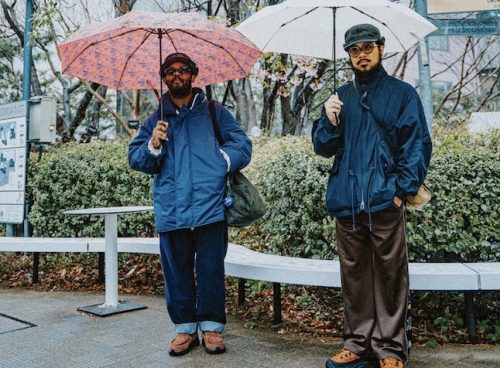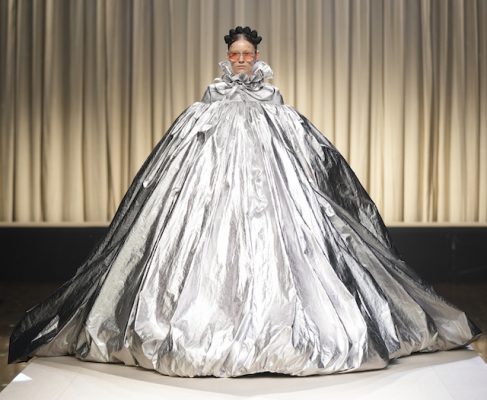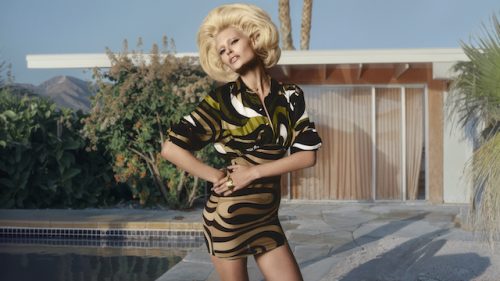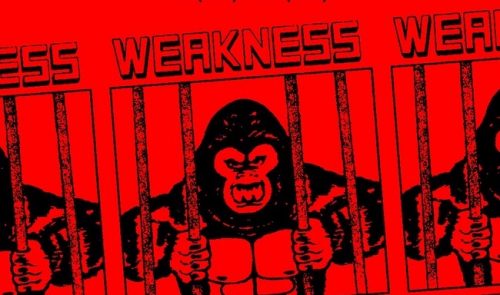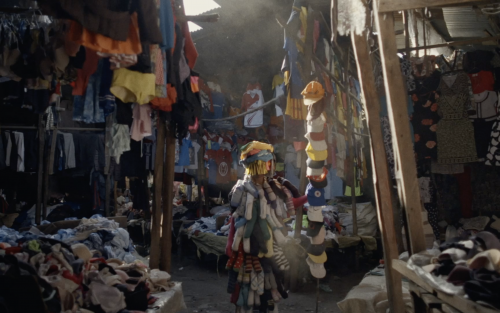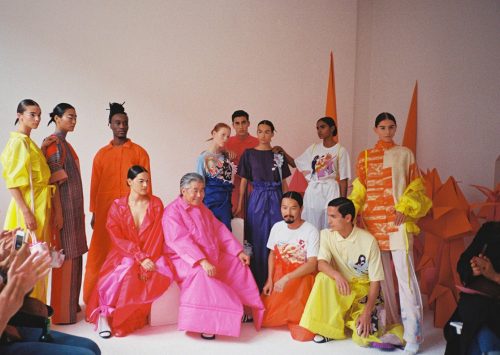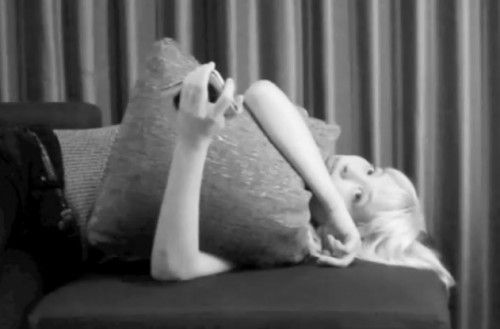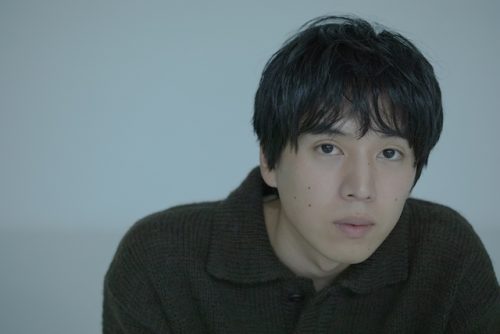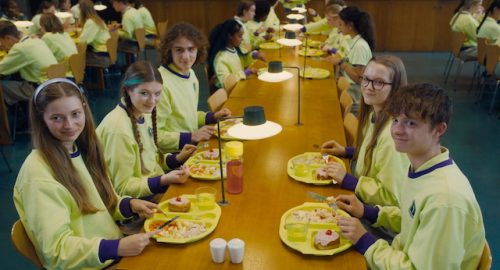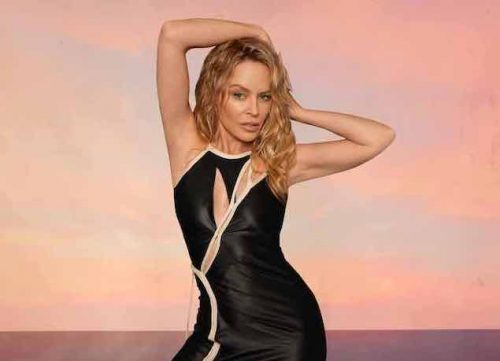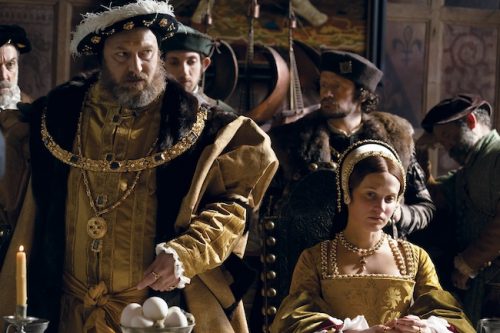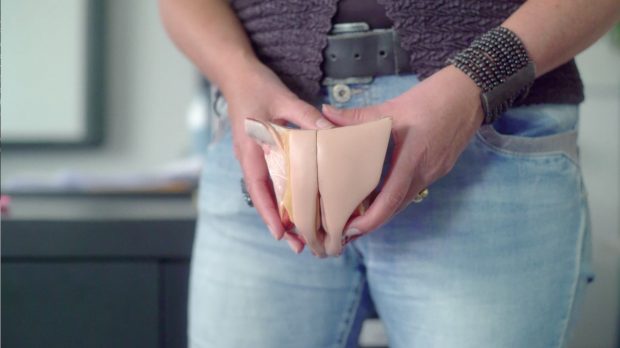
Sex can be an awkward topic for teenagers, especially the moment when you realize it’s an act that was committed by your parents, the creation of yourself as evidence. For Dutch director Anne Van Campenhout however it is more of a fascination, stemming from statistical evidence she found that proves kids these days are watching adult content at a younger age but having sex later on in life. She tells me that Foreplay -a short film documenting the reactions of middle schoolers during their sex education class- is a documentary she wished was available during her awkward phase so she could have felt ‘less alone’ an emotion that comes in hand with topics that are too stigmatized for them to be taken seriously. This is not her first rodeo when it comes to making films about sex, previosuly creating ‘my fucking problem’, a documentary that was critically acclaimed for it’s raw depiction of a hardly talked about but common topic; vaginism. She sat down with me to discuss further about her films and reflect on the positive realities of the Dutch film industry.
-Foreplay is a short film that documented the reactions of junior high school students in the Netherlands during their sex education class. What initially drew you to this topic and why did you feel a sense of urgency to make a film about this during the current social climate?
Anne: I made it for youth, that was the target audience and not for adults. Because I think there are no documentaries on sexuality for them but what they see more and more is sexual content that is not meant for them. I made what I wanted to see myself when I was that age, when you discover sexuality yourself, you feel as if you are the only one in the world and it’s not something to talk about with others. But when you realize that all of these feelings are normal and other kids have these feelings as well, it really helps to normalize it. At first what I found most interesting were the interviews. Then I thought I needed some kinds of framework. If it was just the interviews, it would be too vulnerable and so I needed to invite the young viewers to be able to open up to those interviews. The first chance they get to speak about it is through sex education. So I thought let’s use that as the framework and then they get curious about what is going on in spite of others so it’s a natural way to go into the interviews. I made something that I would have wanted to see but nowadays it’s even more relevant. In the Netherlands at least, studies show that more people see sexual content at a younger age but at the same time, the age they have sexual activity for the first time is ascending for the last ten years. It used to be 16. Now it is 18 when they have sex for the first time. I also think that it is more and more of a taboo thing. We become more liberal but for example, in Poland, they are now trying to criminalize sex education. They want to make it the same act as pedophilia. There is a duality and I think that is a problem because it makes you have more of an idea of how it should be and it becomes less easier to talk about how you feel. So that is why I wanted to make it.
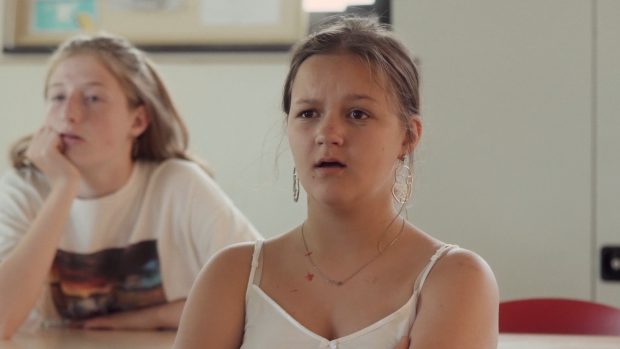
-Junior High School is an awkward phase, in such that the age of 12 to 15 is when you aren’t a kid anymore but you still are not an adult yet. Why did you target this age demographic specifically?
Anne: The ideas that you have about sex, often come from that phase. The ideas of how many times per week or how it should look like or whether you should scream yes or no. I found out recently that a lot of my friend still end the act of sex with cumming in the face which if you think about it comes from porn. If you want to do it then that is absolutely fine but I do think where does that come from?
-Was there an initial reaction that you had predicted to come out and document from the junior high schoolers or was the documentary made to further understand the feelings that kids during this age have towards sex?
Anne: I was really curious about what they thought about sexuality. I thought that they would be more open but then I read all those studies and was just really curious as to how they actually felt. They are just in that phase that I reckon even my parents were in. Even my grandfather felt like that during that age and they can recognize it. Because that phase is universal when you are curious but also grossed out about it when you first realize that this thing that your parents were doing is something that you will be doing in a few years probably. It’s so far away and so close at the same time. In a way it’s the same but the circumstances in which they grew up is different. You can feel that they are struggling to deal with this. So when I asked junior high schoolers how they imagine their first time, I thought they were going to answer in a really romantic way with roses. I thought it would be funny because we all know there are actually no roses and candles. But what they told me was that they will ask the guy or girl to leave their phone outside of the room. I never thought about that. But then I realized you only need to see one video of someone from your school exposed and the impact of that is so big. The whole school might see it. For example the girls in the film where they talk about the girl that went viral and got kicked out of school. When I asked if they had seen the video as well, they said yes. But it is almost impossible not to see it because you can try not to but if someone puts a phone in your face and says look at this, well you’ve already seen it. What can you do about it? You can feel sorry for her but I also liked how they first said ‘yeah of course we laughed about it’ because I understand.
-Especially these days when everyone has a phone and once something is on the internet you can try to delete it but it can never completely be erased can it.
Anne: In the mind of others at least. But at the same time, if you grow up with it you know the dangers of it and to be aware of them. And the impact that it has, I didn’t really foresee that.
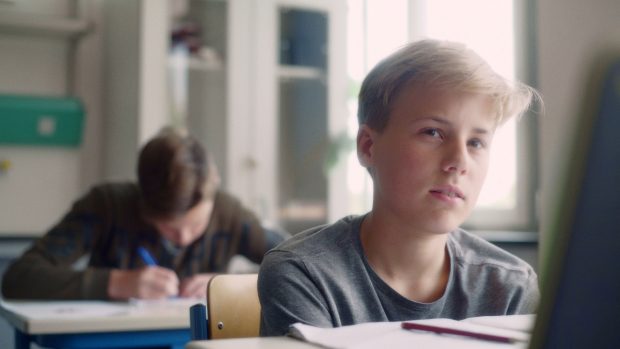
-You filmed in five different junior high schools but out of all of the students that you interviewed was there one reaction that really took you by surprise?
Anne: It was when I asked a boy about sexual harassment about the things that would likely happen to him. I meant as in if he crossed the boundaries of a girl without intending to do so but he listens to it as if he would be the victim. That really confronted me and my assumptions because I assumed that the guy would always be the one being aggressive. For him he thinks what would I do if I were to cross my boundaries and I thought it was really confronting because I thought that he would never be able to be the victim because he is a man.
I didn’t know if I should include it in the film because I didn’t want him to look dumb but I think it says something about the assumptions we have about this and he really thinks about what he would do if he didn’t want to kiss the girl but she did. So it’s a really serious thing that he was thinking about. Then I thought ‘ok,this is probably something that other boys are thinking about as well’ so I included it.
-To the kids watching other kids respond to questions about sex education, how did you think they would react and were initial predictions different to the reactions you got after the screening?
Anne: I did some test screenings but I noticed that it was quite difficult. It’s because there is too much shame around this subject for them to really say how they feel. I noticed their facial expressions were changing and noticed how they were looking at each other but just not speaking out about it to me. But that is also ok. Shame is something that comes when you don’t know how to talk about a certain subject and you are unused to it but maybe next time they will feel less shame.
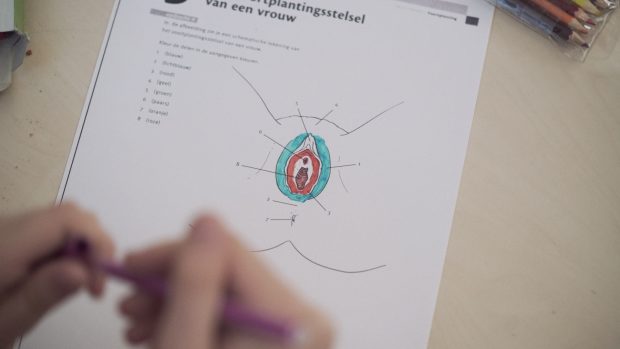
-We cannot talk about your work without mentioning your documentary ‘My fucking problem’ which was given praise for its raw depiction of this common but hardly talked about topic; vaginism. What was different in terms of the filming process of this short, was it difficult being the subject of the film whilst being the director of it simultaneously?
Anne: It was very different making a personal documentary. First of all because the main characters are everyone in your surroundings like my boyfriend. The whole process was different. At first I didn’t want to make it about myself. But then there was no option but to make it about yourself when you are so involved in the subject. So it didn’t feel good to not include myself. I thought that I would include myself as only an interviewer but it was during the filming process when we were checking what to use during the editing process that we decided to use all of the footage. By the end of it, I just felt so comfortable seeing myself that it didn’t feel as intense as it was before.
-So at first it wasn’t necessarily meant to be a film surrounding yourself?
Anne: I wanted to make it from a perspective of a woman who didn’t find penetration obvious and if it is possible to have a nice sex life without penetration. I wanted to do interviews with women who had different point of views. There were people who were totally fine with their sex life without penetration but some who really wanted to have it, some who hadn’t had it for thirty years and my question was what changes over time. But then during the interviews they started to ask me questions. And it was very interesting what happened there so it was a very logical way for it to become more about myself.
-I can imagine you made this film with many intentions. One of them being spreading awareness about vaginism. After getting so many comments from other women saying they had similar problems, did creating the film help you in anyway?
Anne: I grew into it. A lot of the reactions from the other women helped me in feeling comfortable in it. I think I got about a thousand emails
-Neol concentrates on the subject of sisterhood but was there a sense of sisterhood amongst the women that you connected with during the filming of my fucking problem?
Anne: A lot of people wanted to drink coffee with me but there were so many that it was too much for me and I wouldn’t be able to work so I asked them if they wanted to meet up together and I think we did eight times.
I asked my friend for help who knew how to organize and lead those types of groups. She would help me build a programme that didn’t feel too formal but does help people start up a conversation. We asked the women to donate five euros so that we could rent a nice place to meet. We set it up in a feminist library once and a yoga studio. We once wrote letters to my vagina and we would read them to the others so we would have something to start the conversation with.
I didn’t want it to be about me and I really wanted them to connect with each other so that is why I asked for her help and we did it for two years. The first one, almost 40 people came then at the end maybe 8 people, so less and less and it just felt logical to stop. But we continue to do it on Facebook. People brought their mothers, sisters and other people they wanted to talk about it with so they weren’t alone. As a group, one day we did a partner day where the women brought their partners and the partners could meet up. So not only the women could find help but the people around them.
-Were all of the partners accepting?
Anne: There were some who were not. It was important for them. It is tough for the women but it is also tough for the partners who feel bad for it because we want them to be accepting but also it is good for them to be with others and say ‘I hate it ‘and hear others say ‘I hate it’ too. Which is very important. I think the most impressive meeting was with the partners. There is no meet up for people who have partners that find sex painful. So it was the first time that they had a say in this topic.
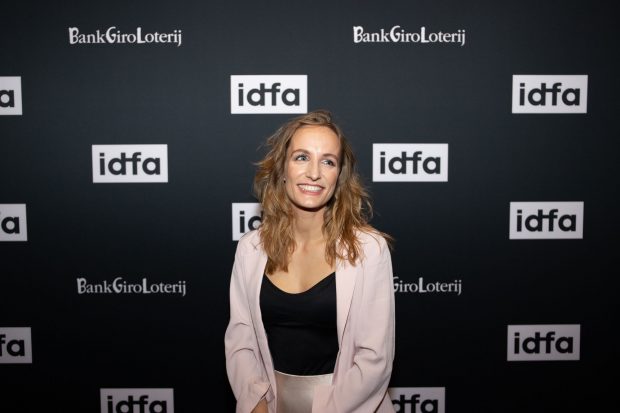
Anne van Campenhout
-Regarding that you do touch on female subjects, would you call yourself a feminist filmmaker?
Anne: I think they promote being open about sexuality. I am a feminist but I am not sure whether my films are about women’s rights or inequality. Foreplay is a film also for boys but I am not sure, I have to ask myself whether or not my films are feministic. But now I think about it all of the films that I have made are always about women. So maybe in an indirect way.
-The Netherlands is famous for its openness and gender equality is less of a problem in this country than others. Are there enough female filmmakers that are getting the spotlight they deserve or do you think they are still underrepresented?
Anne: I think it’s becoming better. When you go to film schools especially in the genre of documentary filmmaking, more than 50% of the directors are female but for fiction, no. The thing I find difficult with being feministic in a way is making all of your subjects about inequality but it can just be a normal thing to interview women about their job. I like to look as it as a normal thing that women are directors more than making it a problem so this is why I want to emphasize not the fact that there are not enough female filmmakers but concentrating more on the positive side of being a female filmmaker. Because if you are a young girl that wants to be a filmmaker I don’t want them to feel as if it is a problem that there are not enough filmmakers but that it is a normal thing to be a director. So that is the kind of activism that I like. To promote something rather than point at something and say what is wrong about it. And there are a lot of good filmmakers out there.
text Ayana Waki
Anne Van Campenhout
Anne Van Campenhout is an Amsterdam based film director. Her work is characterized by urgency in topics and creativeness in style. She is specialized in documentary film, but does commercial and TV work as well.
https://annevancampenhout.nl/
https://www.instagram.com/anne.film/




